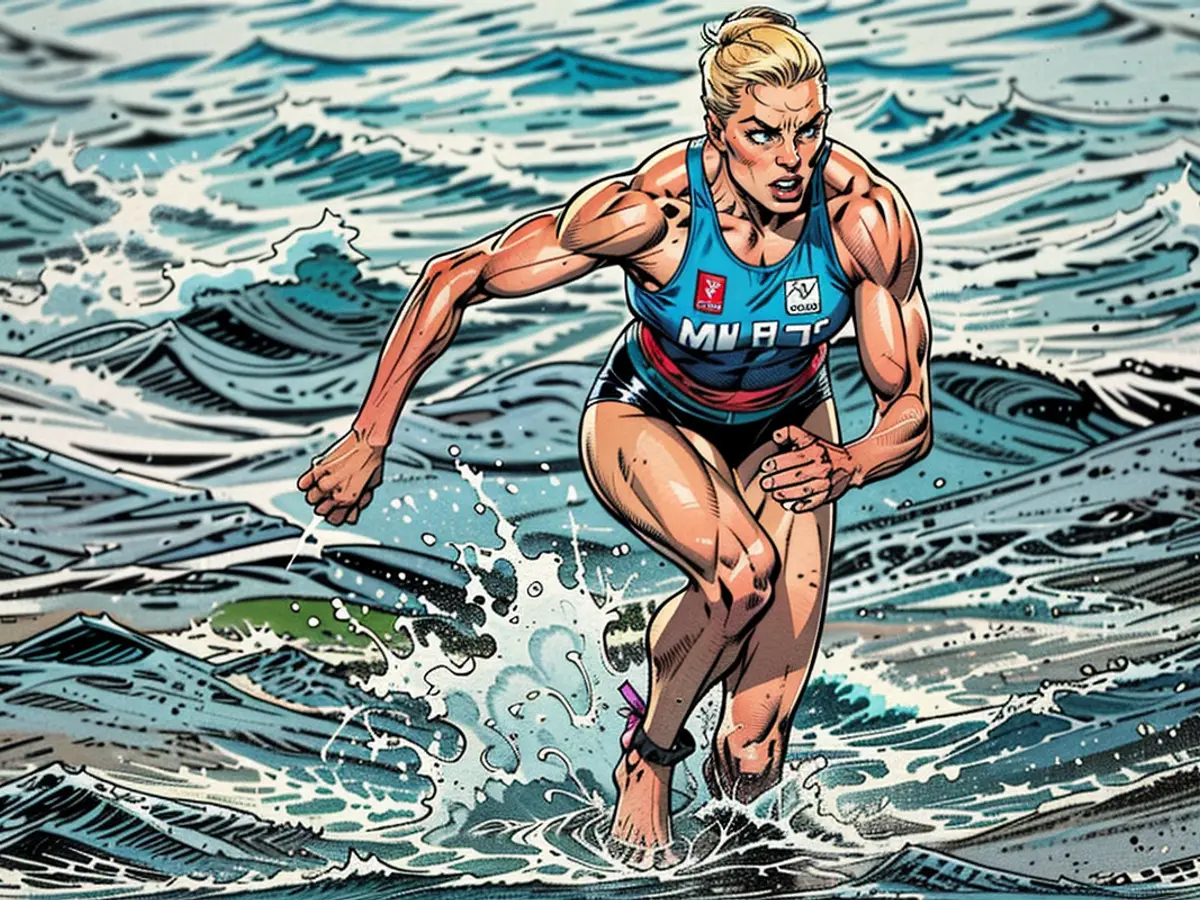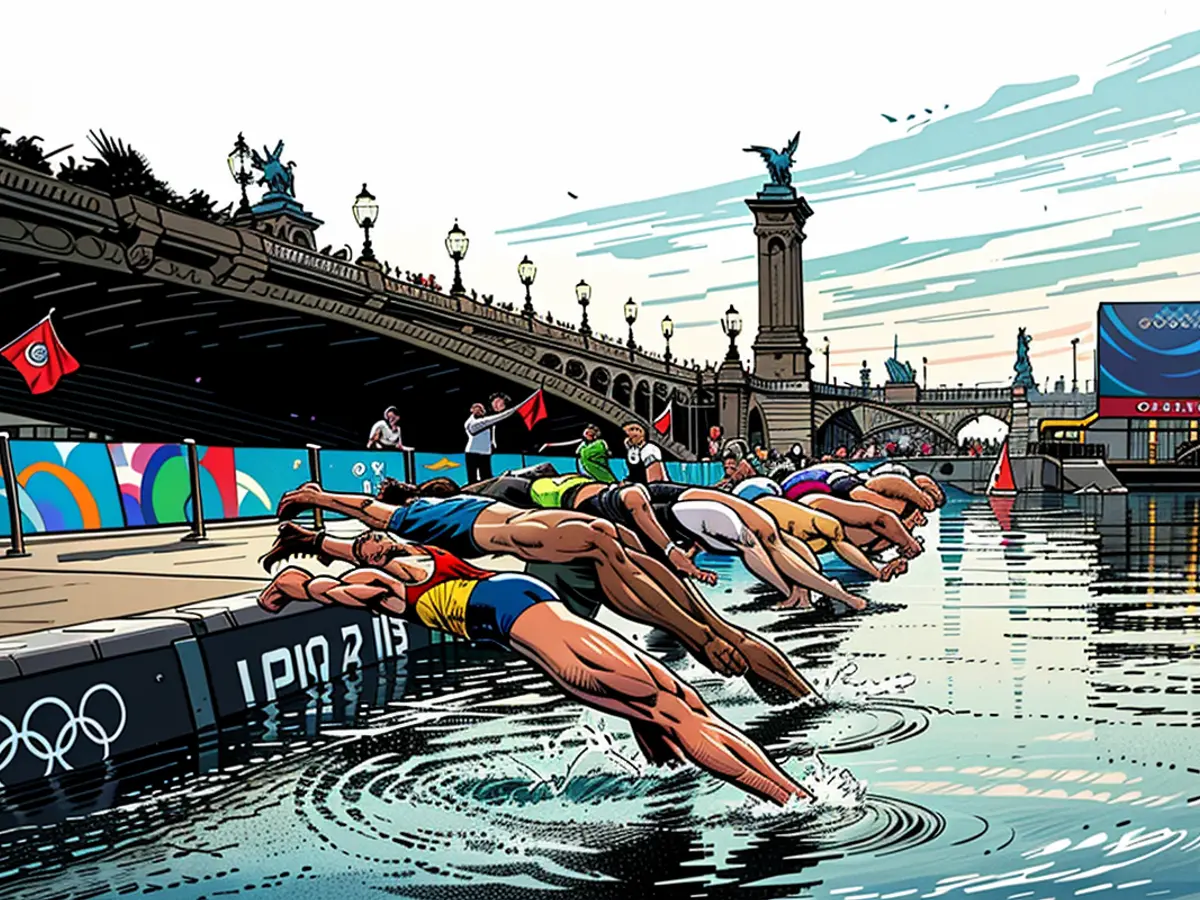Belgium withdraws from mixed relay triathlon after triathlete falls ill days after swimming in the Seine
The statement did not specify Michel’s illness, which was reported days after she swam in the River Seine during the women’s triathlon on Wednesday.
“The BOIC and Belgian Triathlon must unfortunately announce that the ‘Belgian Hammers’ will not be starting the mixed relay at the Paris Olympic Games tomorrow. The decision, like this communication, was taken in consultation with the athletes and their entourage,” the statement read.
“Claire Michel, a member of the relay, is unfortunately ill and must withdraw from the competition.”
Michel finished 38th in the women’s triathlon competition on Wednesday.

The statement also had pointed words that appeared to be aimed at organizers: “The COIB and Belgian Triathlon hope that lessons will be learned for future triathlon competitions at the Olympic Games such as guaranteeing training days, competition days and the competition format, which must be clarified in advance and ensure that there is no uncertainty for the athletes and support personnel.”
Triathlons proceeded amid water quality concerns
The triathlon competitions went ahead in Paris after concerns over water quality in the River Seine caused the men’s race to be postponed a day earlier. More rain came into Paris overnight ahead of the race, but World Triathlon and Paris 2024 determined the water quality was sufficient to move ahead for both the women’s and men’s races.
“Following a meeting on water quality held on 31 July at 3:30 a.m. attended by Paris 2024, representatives of World Triathlon and their Technical and Medical Delegates, Météo France, the City of Paris and the Prefecture of the Île-de-France Region involved in carrying out water quality tests, the stakeholders involved have confirmed that the women’s and the men’s triathlons will go ahead as planned on 31 July at 8 a.m. and 10:45 a.m. respectively,” Paris 2024 and World Triathlon said in a joint statement.
The athletes had largely put their trust in organizers to ensure that the water quality was safe for them. Women’s silver medal winner Julie Derron of Switzerland said the athletes believed that the race was safe based on the word of authorities.
“The swimming was fine during the race. We know that they took samples this morning. They take a lot of time to analyze, so we don’t know the results obviously. We all trust the authorities and the organizers that they keep us safe. And so we had a safe race today,” she said.
After the race, men’s gold medal winner Alex Yee was complimentary to the organizers.
“We’re lucky enough to have probably the most beautiful venue of any race in the Olympics. And I guess that came with a small penalty of the risk of the Seine being dirty,” he said.
Heavy rains battered Paris last weekend, drenching the opening ceremony and raising concerns about water quality in the river, which usually declines after rainfall.
Training was canceled for two straight days last week after water quality testing deemed the water unsafe for athletes, but organizers were confident at the time that the races would go ahead as planned.
Seine clean-up
The decision to hold some swimming events in the famous river that splits Paris raised eyebrows when it was first announced. Swimming in the Seine has been illegal for a century but, in their desire to put the host city on full display, organizers worked up a plan to clean up the river so the world’s best athletes could use it during Paris 2024.
About $1.5 billion (1.4 billion Euros) had been spent trying to clean up the river ahead of the Games and Paris officials have made a big show of displaying its suitability. Paris Mayor Anne Hidalgo swam in the river earlier this month to display her confidence in the river’s water quality and promised to put a swimming pool in the river after the Games. The French sports minister has also gone for a dip in the Seine.

One of the key infrastructure projects designed to help tackle pollution has been a new rainwater storage basin – called the Austerlitz basin – which can hold 20 Olympic swimming pools worth of water, according to a statement from Paris 2024.
Following rainy weather on June 17 and 18, the basin filled to 80% capacity, successfully preventing 40,000 cubic meters (40 million liters) of wastewater and rainwater from being discharged into the Seine, according to the city of Paris.
But the water quality can change fast. Official data shows one-off rainfall events can quickly cause E. coli levels to spike again, and as recently as June 30 – following rain the previous day – E. coli levels increased to around 2000 CFU/100mL at Alexandra III Bridge, where the race is set to begin.
That’s double the level needed for “good” water quality, as per World Triathlon standards.
For much of the month before the games, E. coli levels were above acceptable levels, which could expose athletes to serious health concerns. If E. Coli levels are above 1000 CFU/100mL, the swimming leg of the triathlon will have to be cancelled, according to World Triathlon competition rules, unless the organization’s medical committee decides the race can go ahead.
The individual triathlon races took place with a 1.5-kilometer swim, followed by a 40K bike race – passing by the Le Grand Palais and the Champs-Élysées – before finishing with a 10K run through the heart of the city.
The mixed team relay race involving four athletes – two men and two women – will start with each team member completing a 300-meter swim, followed by a 5.8K bike ride and 1.8K run.
CNN’s Homero De La Fuente, Kevin Dotson and Chris Liakos contributed to this report.
Despite the swim in the River Seine during the women's triathlon potentially contributing to Michel's illness, she excelled in the competition, finishing 38th. Despite concerns about water quality, many athletes trustingly participated in the triathlon events, including the mixed team relay, showcasing their faith in the organizers to ensure safe conditions.







